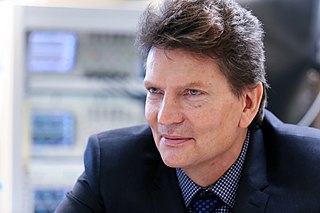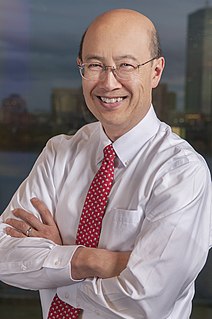Ein Zitat von Henry Markram
99 Prozent dessen, was Sie sehen, ist nicht das, was durch die Augen hereinkommt. Es ist das, was Sie über diesen Raum schließen.
Themen zitieren
Verwandte Zitate
Das Wichtigste, was Sie als CEO lernen können – eines der schwierigsten Dinge, die Sie tun können, ist, dass Sie sich disziplinieren müssen, um Ihr Unternehmen zu sehen … mit den Augen der Menschen, mit denen Sie arbeiten. Durch die Augen der Mitarbeiter, durch die Augen Ihrer Partner... durch die Augen der Menschen, mit denen Sie nicht sprechen und die nicht im Raum sind.
Als jemand, der in den 1970er Jahren nach New York kam, war ich, wie so viele meiner Freunde, zertifiziertes Mitglied dessen, was wir heute die 99 Prozent nennen – und ich war viel näher am unteren Ende als an der Spitze dieser 99 Prozent . Irgendwann in den vergangenen Jahren bin ich in das 1-Prozent-Segment vorgedrungen.
Es klingt so harmlos, aber der Unterschied zwischen 99 Prozent und 100 Prozent ist riesig. Sie können eine Leistung von 99 Prozent erreichen und werden Schmerzen haben, aber wenn Sie sich ein wenig mehr anstrengen – und das ist es, was den Unterschied in Ihrem Training ausmacht – kommen Ihre Beine einfach zum Stillstand. Es ist, als ob Ihr Motor festsitzt.
Denken Sie daran, Leute, jeder dieser Republikaner im Senat sieht die Welt mit den Augen der Linken. Jeder einzelne dieser Washingtoner. Sie sehen es nicht durch das Prisma ihrer eigenen Prinzipien und Überzeugungen. Sie sehen die Welt mit den Augen der Linken. Sie sehen die bevorstehende Medienkritik. Sie sehen die Schlagzeilen der Zeitungen. Sie sehen, was auf CNN und der New York Times über sie gesagt wird. Das ist es, was sie sehen. Das ist ihre Welt.
Ich reagiere empfindlich auf die Kritik [daß es keine neuen Dramatiker hervorgebracht hat], ja. Aber ich bin auch hip dabei. Ich lese jedes Jahr 500 neue Stücke, und 99,99 Prozent davon sind nicht gut. Ich sehe keinen Grund, ein neues Stück zu machen, nur weil es neu ist. Es ist, als würde man seine Schwester küssen, eine Tugend, aber was nun? Mir erscheint es lohnender, einen erfahrenen Dramatiker zu nehmen und zu sagen: Schreiben Sie etwas für uns.
Es gibt viele Möglichkeiten, auf nationaler Ebene wirtschaftlichen Selbstmord herbeizuführen. Der wichtigste Weg im Laufe der Geschichte war die Verschuldung der Wirtschaft. Die Schulden wachsen immer so weit, dass sie von einem großen Teil der Wirtschaft nicht mehr beglichen werden können. Dies ist der Punkt, an dem Sparmaßnahmen durchgesetzt werden und der Besitz von Vermögen zwischen dem einen und den 99 Prozent polarisiert.
Das ist ein weiteres Thema im Buch [Träume von meinem Vater]. Wie üben wir mehr Empathie in unserem öffentlichen Diskurs aus? Wie bringen wir das Schwarze dazu, durch die Augen des Weißen zu sehen? Oder soll der Bürger durch die Augen des Einwanderers sehen? Oder der direkte Blick durch die Augen des Schwulen? Das war schon immer ein Kampf in unserer Politik.
Wenn Sie Möbel für Ihr Zuhause auswählen, die zum Ausdruck bringen sollen, wer Sie sind, wollen Sie damit auch sagen, dass Sie anderen Menschen das vermitteln möchten, was Sie ihnen vermitteln möchten. Was ist, wenn sie etwas anderes sehen? Wäre es nicht wirklich deprimierend, wenn du versuchst, unkonventionell zu sein und sie dich stattdessen als Rush Limbaugh sehen?
Ökonomen leiden unter einer tiefgreifenden psychischen Störung, die ich „Physik-Neid“ nenne. Wir wünschen uns, dass 99 Prozent des wirtschaftlichen Verhaltens durch drei einfache Naturgesetze erfasst werden könnten. Tatsächlich haben Ökonomen 99 Gesetze, die 3 Prozent des Verhaltens erfassen. Wirtschaft ist ein einzigartiges menschliches Unterfangen.





































